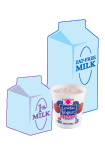|
Special Health Needs

 Medical conditions and allergies Medical conditions and allergies
Some women have specific health needs while they are pregnant or breastfeeding, because of a medical condition. These conditions include diabetes, celiac disease, renal disease, and phenylketonuria (PKU).
If you have a medical condition, ask your health care provider for advice about food choices while you are pregnant or breastfeeding.
 Other women may have specific needs because of a food allergy, such as an egg, nut, or wheat allergy. If you have a food allergy, ask your health care provider for advice about food choices while you are pregnant or breastfeeding. Other women may have specific needs because of a food allergy, such as an egg, nut, or wheat allergy. If you have a food allergy, ask your health care provider for advice about food choices while you are pregnant or breastfeeding.
In addition, if you have any allergies, or your family has a history of allergies, ask your health care provider about avoiding common food allergens such as peanuts while you are pregnant or breastfeeding.
If you are breastfeeding and your baby has a medical condition or a food allergy, visit your health care provider and follow their advice about your food choices.
Lactose intolerance
If you avoid milk because you are lactose intolerant, the most reliable way to get the health benefits of milk is to select lactose-free milk and milk products.
You can also take a lactase pill or drops that help you digest lactose before eating or drinking  milk products. Check with your health care provider for their advice if you have trouble digesting milk products. milk products. Check with your health care provider for their advice if you have trouble digesting milk products.
In addition, many people who have a problem digesting lactose can usually eat or drink:
- Up to 1 cup of milk with a meal
- Yogurt or cheese
- Milk on hot or cold cereal
Remember to choose low-fat or fat-free milk, yogurt, and cheese products.
If you do not drink or eat any milk products, be sure to get the calcium you need from other foods. These include:
- Calcium-fortified soy or rice beverages, juices, cereals, or breads
- Canned fish (sardines, salmon with bones)
- Soybeans, black-eyed peas (cow peas), white beans, and soy products like tofu prepared with calcium sulfate
- Some leafy greens (collard and turnip greens, kale, and bok choy)
The amount of calcium that can be absorbed from these foods varies. Click here for a list of non-dairy calcium sources.

|

